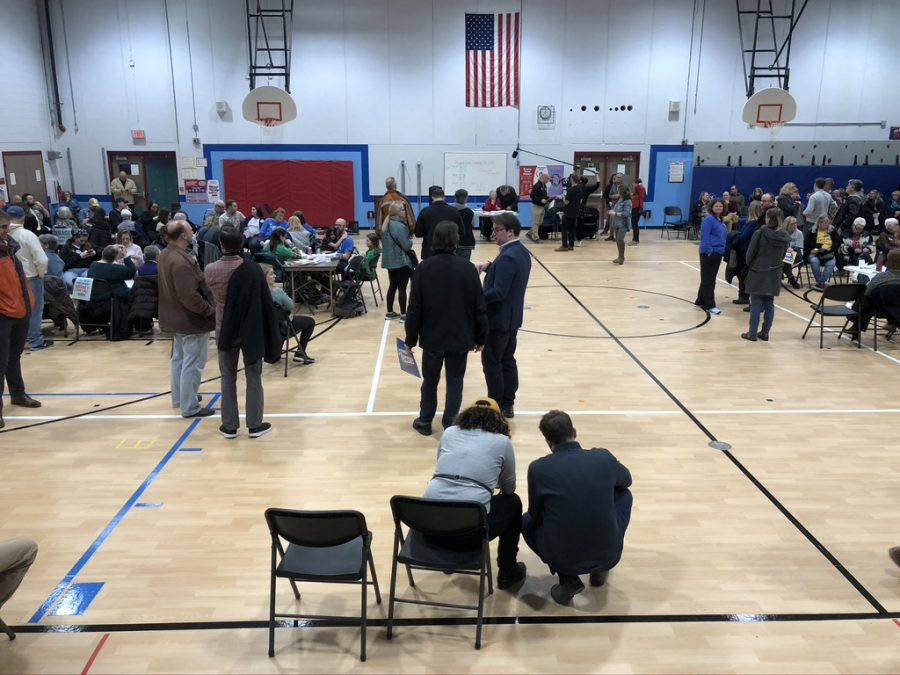A Humble Suggestion for Improving the Caucuses
An Essay on Politics
Iowans caucus to determine the Democratic nominee for President of the United States in a suburb of Des Moines. The caucus system may be flawed, but it is not a lost cause.
February 12, 2020
Having read the previous correspondence on the caucuses, I find that I cannot dispute the arguments of the caucus critics. The caucuses are not reflective of the actual votes. Not all citizens have equal say. Only a fraction of the population turns out to vote. Yet nothing can be viewed in a vacuum; let us, then, make inquiry as to how these principles are applied elsewhere.
Let us start with the Electoral College. My computations suggest that a person living in Wyoming has more than three times the voting power in presidential elections as a person in Illinois. Some may argue that this is undemocratic, but that is clearly not the case. It is merely a reflection of our federal system.
This “misrepresentation” is not confined to the caucuses or the Electoral College. Republican legislators in Wisconsin engaged in a brilliant political maneuver that enabled them to win 64 percent of the seats in the state legislature when Democrats won 53 percent of the vote. Tales of similar feats of flawless strategy and political courage abound. I will not even mention the closure of polling places, nor the voter purges, nor the demonstrations of commitment that some states require of their citizens. Nor will I so much as speak of the millions that some candidates have injected into their campaigns, of the rise of 501(c)(4) nonprofits and Super PACs. These are all simply wise and foresighted measures undertaken to ensure that those who deserve more influence in government are given more influence in government.
We would do well to discuss the turnout in federal elections before we argue that caucuses suppress turnout. Some 60 percent of the voting-eligible population votes in the presidential contest; midterms see turnout rates of less than 50 percent. One may hypothesize that these figures run contrary to the principle of civic engagement, but they clearly reflect a choice on the part of the nonvoting citizenry to stay home. The same is true of the caucuses.
We may criticize these perceived failings, but what would that accomplish? Even supposing that there are flaws in our electoral system, there is nothing to be done about it. It would take a constitutional amendment to abolish the Electoral College or overturn Citizens United and related Supreme Court decisions. Only legislating same-day voter registration and declaring Election Day to be a national holiday would increase voter turnout. None of these measures are remotely feasible, as the august Majority Leader of the Senate, Addison McConnell Jr, has recognized that there are no flaws in the electoral system whatsoever and will not allow the Senate to be debased to the point of nonsense and show trials.
If, then, there is nothing wrong with the electoral system of the nation as a whole, what could possibly want fixing about the caucuses? There are two possibilities: that Sen McConnell is somehow mistaken, in which case the entire system is a catastrophic mess that needs a complete and total overhaul, or that he is correct, in which case this is all hysteria.
Upon reflection, however, it does appear that there are several problems with our elections. There is the risk that illegal aliens might surreptitiously seek to vote; that domestic enemies of the government might seek to manipulate the outputs of our voting machines; that nightmares might wake in the fens and hijack the ship of state. These are very real threats, as many credible media outlets have reported.
It appears, then, that the only solution is to do away with elections entirely. They are all too prone to abuse. This may seem like an argument for dictatorship, but it is nothing of the kind; it is merely an astute observation of fact tempered with an intelligent application of logic.
Note, as Harvard Law School professor Alan Dershowitz did, that the re-election of congresspersons and presidents is, for the most part, in the national interest. The national interest should be the sole focus of the nation. Mr Dershowitz may teach at a den of sedition and anti-Americanism, but his argument is clearly true, and it leads us to the conclusion that it should be our sole focus to bring about the re-election of our officials at all levels of government.
Elections are expensive; the 2016 election cost the Union approximately $6 billion in advertising costs alone. Cancelling the 2020 election and all subsequent contests, therefore, would bring untold benefit to the taxpayers. I am not advocating for tyranny; I am calling for the conservation of our country’s limited resources.
The abolition of elections would eliminate the caucus messiness that has provoked so much furor, would prevent illegal aliens from voting, and would stop anti-government agitators from interfering with electronic voting machines. The tens of billions in savings each decade could be applied to dramatically reduce the debt over a period of only a few centuries, or — more tastefully — could be pooled to purchase one medium-sized pizza for every natural-born American every two years, lifting millions off food stamps in the process.
In conclusion, the caucuses may be beset by perceived faults, but these pale in comparison to the deadly terrors posed by elections in general. We must, therefore, in my humble opinion, as I have suggested previously, cancel all elections in the United States beginning with the 2020 presidential contest — in order to promote the national interest, of course.
I am confident that the President in his wisdom will take up this humble suggestion and propose legislation to such effect to the Senate. When he does so, I am sure that he will be met with thunderous applause.







